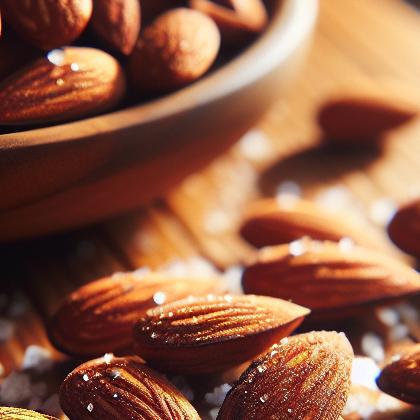Roasted Almond

The almond (Prunus dulcis, syn. Prunus amygdalus, Amygdalus communis, Amygdalus dulcis) (or badam in Indian English, from Persian: بادام) is a species of tree native to the Middle East and South Asia. "Almond" is also the name of the edible and widely cultivated seed of this tree. Within the genus Prunus, it is classified with the peach in the subgenus Amygdalus, distinguished from the other subgenera by the corrugated shell (endocarp) surrounding the seed.The fruit of the almond is a drupe, consisting of an outer hull and a hard shell with the seed (which is not a true nut) inside. Shelling almonds refers to removing the shell to reveal the seed. Almonds are sold shelled (i.e., after the shells are removed), or unshelled (i.e., with the shells still attached). Blanched almonds are shelled almonds that have been treated with hot water to soften the seedcoat, which is then removed to reveal the white embryo.
Roasted almond Pairs With:

Roasted almond Properties:
| Food Property | Type | Description |
|---|---|---|
| Flavor Profile | Sweet | Roasted almonds have a slightly sweet flavor due to natural sugars present in the almonds. |
| Bitter | Roasted almonds can have a slightly bitter undertone from the roasting process. | |
| Texture | Crispiness/Crunchiness | Roasted almonds have a crispy and crunchy texture, making them satisfying to snack on. |
| Nutritional Value | Macronutrients | Roasted almonds are high in healthy fats, protein, and fiber, making them a nutritious snack option. |
| Micronutrients | Roasted almonds are a good source of vitamin E, magnesium, and antioxidants. | |
| Color | Maillard Reaction | Roasting almonds causes the Maillard reaction, resulting in a darker color and rich flavor. |
Food Pairing App - Version 1.2.0
